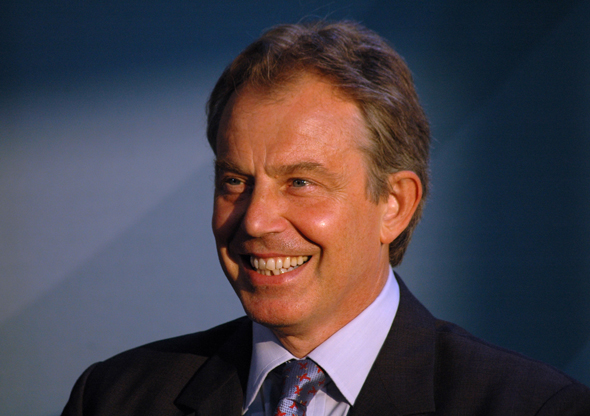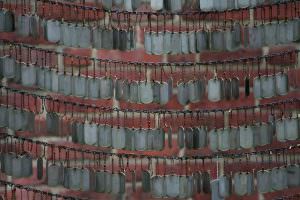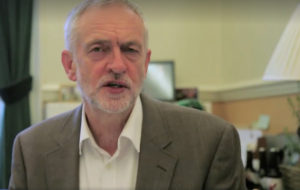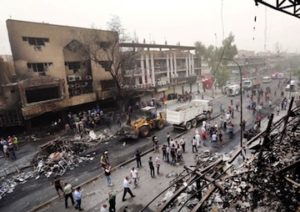Chilcot Report on Iraq War Is ‘Damning Verdict’ for Former U.K. Prime Minister Tony Blair (Video)
The United Kingdom's official inquiry into the Iraq War has revealed that former Prime Minister Tony Blair "deliberately exaggerated [the] threat from Iraq" and did not exhaust all possibilities before resorting to military action. After the report was released on Wednesday, current Labour Party leader Jeremy Corbyn issued an apology on behalf of his party for its role in the war. (Updated) Former British Prime Minister Tony Blair. (360b / Shutterstock.com)
Former British Prime Minister Tony Blair. (360b / Shutterstock.com)
Former British Prime Minister Tony Blair. (360b / Shutterstock.com)
Update 7/ 7/2016 8:03 a.m. PST: Jeremy Corbyn issued an apology on behalf of the Labour Party for its role in the “disastrous” Iraq War, as he’d promised to do 9 months ago when he was first elected as leader.
Below you can also watch the entire Parliament debate on the Chilcot Report:
Update 1:03 p.m. PST: Historian, activist and commentator Tariq Ali told “Democracy Now!” that “to have official confirmation that what we were all saying was right is nice, but it’s too little and too late.”
“The report itself doesn’t allow the state to actually prosecute Blair for war crimes,” Ali continued. “He is a war criminal. He pushed the country into this illegal war. His supporters in Parliament are trying to get rid of Jeremy Corbyn, who was 100 percent right on this war, backed by the bulk of the media. So we’re in a strange situation now. The report, I think, will anger lots of people who, unlike us, were not convinced by the movement that what was taking place was a lie, based on a lie, and it was illegal. What is going to happen now remains to be seen, but I would very much hope that independent groups of lawyers and jurists demand now that Blair is charged and tried. It’s very clear he pushed the war. He forced the intelligence services to prepare dodgy dossiers. He pushed his attorney general to changing his opinions before he was allowed to address the Cabinet. All that, we have in the report. The question is: Is anyone going to answer for it, or is this just designed to be therapeutic?”
Update 12:08 p.m. PST: The Guardian reminds readers that eight months before the Iraq invasion, Tony Blair offered George W. Bush his unqualified support for the invasion of Iraq, saying in a letter, “I will be with you, whatever.”
In a six-page memo marked secret and personal, the then British prime minister told Bush, US president at the time, in July 2002 that the removal of Saddam Hussein would “free up the region” even if Iraqis may “feel ambivalent about being invaded” and could well fight back.
It was one of several confidential letters Blair sent to Bush in the run-up to the Iraq war, during the conflict and in its devastating aftermath, released on Wednesday as part of the Chilcot report.
They paint a picture of Blair wrestling with the absence of evidence of weapons of mass destruction (WMDs) in Iraq, struggling to persuade Bush to try to win UN support for invasion, of his own conviction of the moral rightness of toppling a dictator, and of his belief that a new Arab democracy would rise afterwards.
They also reveal the stark transition Blair underwent in the immediate aftermath of the toppling of Saddam as he told Bush of his deepest fears that “if it falls apart, everything falls apart in the region”.
Update 12:00 p.m. PST: The U.S. diplomat whose job it was to lead the occupation of Iraq in 2003 has backed several core criticisms made by the Chilcot inquiry, contrary to the reactions of former president George W. Bush and other Republicans.
The Guardian reports:
Writing in the Guardian, Paul Bremer – who administered the coalition provisional authority (CPA) in the months after the war – agreed that prewar planning by both US and UK governments was “inadequate” and accused political leaders of ignoring internal warnings.
“The [Chilcot] commission noted that that ‘bad tidings’ tended not to be heard in London,” he said. “The same was true in Washington. Before the war, a few American military officers suggested the need for a substantial post-conflict military presence. They were not heard.”
Bremer also sharply criticised the failure of western forces to prevent looting in Iraq after the invasion and unrealistic troop commitments made by political leaders in Washington and London.
“As David Richmond, one of the able British CPA colleagues, told the commission, the coalition ‘never got on top of security’,” he added. “So the coalition gave the impression to Iraqis that we were not serious in this most important goal of any government. No doubt this failure encouraged some members of what became the resistance.”
Update 8:05 a.m. PST: Blair has taken “full responsibility” for the decision to go to war in Iraq, but he justified his choice for over an hour at a press conference after the release of the report from the formal investigation led by Sir John Chilcot. Here’s the former British Prime Minister’s full statemen on the reportt:
The United Kingdom’s official inquiry into the Iraq War has revealed that former Prime Minister Tony Blair “deliberately exaggerated [the] threat from Iraq” and did not exhaust all possibilities before resorting to military action. Below is a clip from Sir John Chilcot’s introduction to the report:
You can also download and read the full report here.
Family members of soldiers who died in the Middle East war are calling for legal consequences to Blair’s actions. Meanwhile, Prime Minister David Cameron, who voted for the war, has been quick to say that while the mistakes from the Iraq War must not be repeated, this does not mean that all military intervention on the U.K.’s behalf should be ruled out nor that the Brits should not stand behind Americans in the future.
Here are some excerpts from Cameron’s statement:
“We must all pledge this will never happen again,” he said, noting that all MPs who voted as he did in favour of the war must take their share of responsibility. “We cannot turn the clock back.”
He stressed there were lessons that the UK should not draw. He maintained that the UK must stand with its American allies where they have common interests, and that the public should still be able to rely on the “judgments of our brilliant intelligence agencies”.
“It would also be wrong to conclude our military are not capable of intervening successfully,” he said, citing Sierra Leone as an example where military action ended with a positive outcome.
Cameron touched on his own record of intervention, saying he still believed it had been right to remove Colonel Muammar Gaddafi in Libya despite the “difficulties plain for all to see” after that happened.
Labour Party leader Jeremy Corbyn, who had campaigned against the war, had a very different message to convey.
Jeremy Corbyn said the war “was not in any way, as Sir John Chilcot says, a last resort. Frankly, it was an act of military aggression launched on a false pretext, as the inquiry accepts, and has long been regarded as illegal by the overwhelming weight of international legal opinion.”
Going to war without UN authorisation was “profoundly dangerous and would set off series of uncontrollable and destructive events,” Corbyn added. … “All but 16 members of the official opposition supported the war, many in my party voted against, indeed members here on all benches voted against the war, but none of us should take any satisfaction from that. We have to be saddened as to what has been revealed.” … “The reality is it was the original decision to follow the US president into the war, one of the most volatile regions in the world, and impose a colonial-style occupation that led to every other disaster.”
Corbyn did not mention Blair by name in his statement but heavily implied that he felt the former prime minister had given incorrect information to parliament.
“We now know that the house was misled in the run-up to the war and the house must now decide how to deal with it 13 years later, just as all those who took the decisions laid bare in the Chilcot report must face up to the consequences of their actions, whatever they may be,” he said.
Read more.
Here’s a clip from the speech Corbyn delivered in Hyde Park, London, at a rally against the Iraq War in 2003.
— Posted by Natasha Hakimi Zapata
Your support matters…Independent journalism is under threat and overshadowed by heavily funded mainstream media.
You can help level the playing field. Become a member.
Your tax-deductible contribution keeps us digging beneath the headlines to give you thought-provoking, investigative reporting and analysis that unearths what's really happening- without compromise.
Give today to support our courageous, independent journalists.



